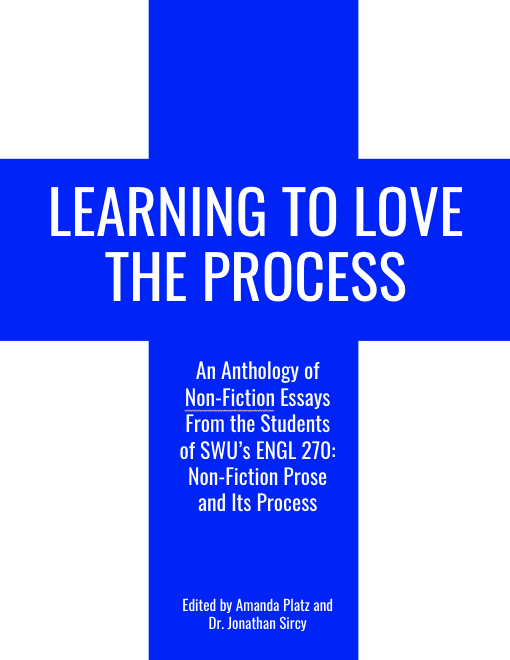
Learning To Love The Process: Introduction
Tomorrow is SWU’s graduation. As a tribute to the exemplary students who graduated this year and last, we’ve put together an ebook of the best work produced by many of those students. You can download the ebook here. The following is my introduction to the collection.
The fall 2018 semester was my first at Southern Wesleyan University, and I was assigned one upper-division course—ENGL 270: Non-Fiction and Its Process. There was, as they say, just one problem: I had no idea how to teach it.
The course had no institutional precedent. Though ENGL 270 had been in the SWU catalog for a few years, no one had actually taught it before. I certainly had no personal precedent for the course. My area of expertise was the English Renaissance, and I doubted that assigning Richard Hooker, Roger Ascham, and Sir Francis Bacon would kindle my students’ desire to write.
So I leaned on what I knew. We read one book: David Foster Wallace’s essay collection A Supposedly Fun Thing I’ll Never Do Again. The book had (at least) three merits. I loved the essays, and I knew that even if they fell flat with students, I would be passionate about teaching them. The essays were diverse; a memoir about growing up playing tennis in the Midwest was next to a profile of film director David Lynch which was next to a travelogue of going on a week-long luxury cruise (the “supposedly fun thing” of the book’s title). As a result, Wallace’s essays helped me decide what kind of essays the students would write: a memoir, a profile, cultural criticism, and one that combined at least two of those three. Finally, Wallace’s prose was so good, so smart and so funny (often simultaneously), that there was no illusion that we could do what he was doing. He both showed why writing non-fiction was a worthwhile pursuit and forced us to focus on the craft of writing. We weren’t going to produce essays as good as his, but we could learn to love the process of trying.
From the very beginning, the students were committed to the writing process, even if they didn’t love it. Unsurprisingly, most of the essays in this collection are the product of revision—and I don’t mean simply revisions between first and second drafts. I mean revisions between final drafts and better additional drafts. Almost no one got it right the first or second or even the third time. Reflecting on what she had learned in the course, Julia Joyce wrote, “Going through the process took fortitude, but the satisfaction with a better end product made it at least tolerable.” For many students, learning to love the process meant learning to trust that the hard work required by that process would be worth it. This collection testifies that it was.
A quick story about Julia, who has three essays in this collection: the semester she took ENGL 270 was her last at SWU. With Julia’s ‘A’ assured, I submitted her final grade to the registrar early so everything would be in order for her graduation. And yet, less than a week before commencement, Julia sent me an email that read: “I had no intention of returning to these essays, but it felt like I was leaving something undone.” Attached to the email were two essays which she, of course, had significantly improved.
I’m deeply convinced of the connection between education and discipleship, not just at the level of content but in the very approach we take to teaching students and following Jesus. Working at a Christian university makes this connection more overt. What I teach and how I teach are deeply intertwined. I approached this course as a far-from- finished product. The course required that I be vulnerable and that I show a willingness to revise and improve as a teacher even as I taught my students to revise and improve their writing. Consequently, my affection for the course and this set of students deepened when I began bringing in my own writing for review. I realized that I needed to write the essays I was asking my students to write and that in giving them drafts and revisions, I was submitting myself to the same process I was teaching them to adopt.
The essays in this collection are exemplary. Even before the course ended, I was thinking about editing a collection of the students’ best work. In April 2019, four of these students read their essays for a student-led Humanities Division chapel, and I was struck again by just how good the essays were and remained convinced that it would be worthwhile to collect the best essays those students produced. I made a table of contents consisting of at least one essay from each of the course’s twelve students, and last summer, Amanda Platz (whose essay in the Hybrids section is one of the collection’s best) edited most of the essays here. Many of these students, including Amanda, graduated in 2019. Now, as the remainder of these students graduate in spring 2020, I wanted to finish the anthology as a tribute to them.
As it turns out, I’m scheduled to teach ENGL 270 again this fall.
I can’t wait.